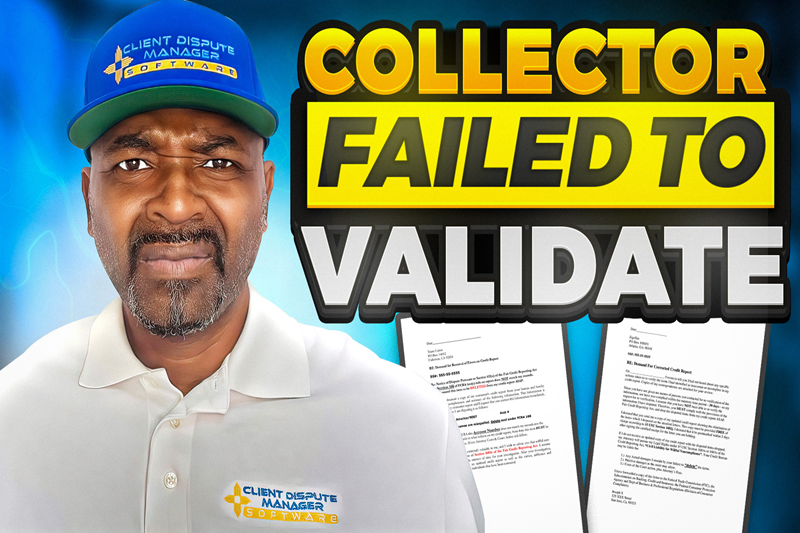If inaccurate debt collections are harming your credit score, you’re not alone. Millions of Americans face this issue due to reporting errors, outdated information, or even fraud. These inaccuracies can severely impact your financial well-being, making it harder to secure loans, housing, and employment. This comprehensive guide will walk you through the step-by-step process of identifying, disputing, and ultimately removing inaccurate debt collection from your credit report.
Understanding Your Rights
Before diving into the nitty-gritty of debt disputes, it’s crucial to understand your rights as a consumer. Two key pieces of legislation – the Fair Credit Reporting Act (FCRA) and the Fair Debt Collection Practices Act (FDCPA) – offer powerful protections against unfair credit reporting and debt collection practices.
Under the FCRA, credit bureaus and data furnishers (like creditors and debt collectors) have a legal obligation to report accurate information about you. If they fail to do so, you have the right to dispute any inaccuracies and demand an investigation. The FDCPA, meanwhile, prohibits debt collectors from using deceptive, unfair, or abusive tactics to collect a debt. This includes attempting to collect a debt you don’t owe or failing to provide proof of the debt’s validity upon request.
Initial Steps for Removing Inaccurate Debt Collections
So, where do you start when you spot an inaccurate debt collection on your credit report? The first step is to file a formal dispute with the credit bureau reporting the item. Here’s how:
Identify The Inaccuracy
Carefully review your credit report and pinpoint the specific debt collection you believe to be inaccurate. Note the creditor’s name, account number, and any other relevant details. Look for red flags like:
- Debts you don’t recognize or never owed
- Incorrect account numbers or creditor names
- Inaccurate balances, dates, or payment statuses
- Multiple listings of the same debt
- Debts that are too old to be reported (generally over 7 years)
Highlighting these discrepancies will be crucial when drafting your dispute letter.
Draft A Dispute Letter

Write a clear, concise letter to the credit bureau explaining why you’re disputing the debt. Be sure to include:
- Your full name and address
- A copy of your credit report with the inaccurate item circled
- The specific reasons you’re disputing the debt (e.g., “I never opened this account,” “The balance is incorrect,” “This debt is too old to be reported”)
- Any supporting documents that prove your case (e.g., canceled checks, account statements, court rulings)
- A request for the bureau to investigate the debt’s validity and remove it from your report if unverifiable
Keep your dispute letter factual and to-the-point. Avoid emotional language or personal attacks on the creditor or collector.
Send The Letter Via Certified Mail
Mail your dispute letter to the credit bureau using certified mail with a return receipt requested. This provides a paper trail showing when your letter was sent and received. Keep copies of everything you mail for your records.
Once the credit bureau receives your dispute, they’re required to investigate the matter, typically within 30 days. They’ll contact the data furnisher (i.e., the debt collector) and ask them to verify the debt’s accuracy. If the debt cannot be verified, the credit bureau must remove it from your report.
If the bureau’s investigation doesn’t resolve the issue, you can escalate your case to the Consumer Financial Protection Bureau (CFPB) or your state Attorney General’s office.
Demanding Debt Validation
In addition to disputing the debt with the credit bureau, you should also demand that the debt collector validate the debt. This is a crucial step, as it puts the onus on the collector to prove that the debt is indeed yours and that they have the legal right to collect it.
To demand validation, send a written request to the debt collector within 30 days of their initial contact. Your debt collection removal letter should:
- Request that the collector provide proof of the debt’s validity, such as a copy of the original contract bearing your signature or a detailed account statement.
- Ask for the name and address of the original creditor, as well as the current creditor if the debt has been sold.
- State that if the collector fails to provide adequate validation, you expect them to cease collection efforts and remove the debt from your credit report.
If the collector cannot provide sufficient proof of the debt’s validity, they must stop attempting to collect it and inform the credit bureaus that the item is disputed.
Remember, even if the debt is yours, collectors must still follow strict rules under the FDCPA. They cannot harass you, threaten you, or discuss your debt with third parties. If a collector violates your rights, file a complaint with the CFPB and consider legal action.
Responding to Insufficient Validation
What if the debt collector responds to your validation request, but the “proof” they provide is inadequate? This is where you need to take a stand. Write a follow-up letter to the collector, clearly explaining why their validation is insufficient. For example:
- They provided a generic account statement without your name or signature.
- They failed to provide proof of their legal right to collect the debt.
- The documentation they sent doesn’t match the amount or dates of the reported debt.
Remind the collector that under the Fair Debt Collection Practices Act (FDCPA), they’re prohibited from collecting a debt they cannot validate. Inform them that if they continue to report the unvalidated debt to the credit bureaus, you’ll file complaints with the Consumer Financial Protection Bureau (CFPB) and your state Attorney General’s office.
If the collector still fails to provide adequate validation, send a copy of your correspondence to the credit bureaus as evidence in your ongoing dispute. The bureaus are required to consider all relevant information in their investigations.
Escalating The Dispute
If the debt collector fails to respond or provides inadequate validation, it’s time to loop back with the credit bureaus. Draft a new dispute letter emphasizing that despite your efforts, the collector has failed to verify the debt. Include copies of your correspondence with the collector as evidence. Reiterate your request for the bureaus to removing inaccurate debt collections from your credit report.
Under the FCRA, the credit bureaus must investigate your dispute and remove any information that cannot be verified. If they fail to do so, they may be in violation of federal law.
If the bureaus still refuse to remove the unverified debt, you may need to escalate your case to the CFPB, your state Attorney General, or even a consumer law attorney. These resources can apply additional pressure on the bureaus and collectors to comply with the law.
If the Debt Remains on Your Report
In some cases, even after multiple disputes and validation requests, a debt collection may remain on your credit report. If you believe the credit bureaus or debt collector are violating the FCRA or FDCPA, you have a few options:
File A Complaint With Regulatory Bodies

You can submit complaints to the CFPB, FTC, or your state Attorney General’s office. These regulatory bodies can investigate the matter and take action against the offending parties.
When filing a complaint, include:
- Your personal information and contact details
- The name of the company you’re complaining about
- A detailed description of the issue and your dispute process
- Copies of any relevant documents (dispute letters, collector correspondence, credit reports)
- How you’d like the issue to be resolved
The CFPB and FTC have online complaint portals, while your state Attorney General’s office likely has a consumer protection division you can contact.
Consider Legal Action
An experienced consumer law attorney can help you navigate the complex world of credit disputes and, if necessary, file a lawsuit against the credit bureaus or debt collector.
Many consumer attorneys offer free consultations and work on contingency, meaning they only get paid if you win your case. Research attorneys in your area who specialize in FCRA and FDCPA cases.
In a successful lawsuit, you may be entitled to:
- Actual damages (any money lost due to the inaccurate reporting)
- Statutory damages (up to $1,000 per FCRA violation)
- Punitive damages (in cases of willful noncompliance)
- Attorney fees and court costs
Even if you don’t ultimately sue, simply having an attorney can often compel credit bureaus and collectors to resolve disputes more quickly.
Leveraging Your Experience
As you work to removing inaccurate debt collections from your credit, you’ll likely gain a wealth of knowledge about consumer rights, credit disputes, and debt validation. Why not use this hard-earned expertise to help others in similar situations?
Assist Others With Removing Inaccurate Debt Collections From Credit
Offer to review friends’ and family’s credit reports, draft dispute letters, or guide them through the validation process. Your knack for tackling debt problems can really make a difference for others.
Some ways to share your knowledge:
- Write blog posts or social media content about credit repair strategies
- Volunteer at local financial literacy events or workshops
- Offer one-on-one coaching or consultation services
- Create downloadable templates for dispute letters and validation requests
Not only will you be empowering others, but you’ll also be reinforcing your own credit repair skills.
Turn Your Skills Into A Side Hustle Or Business
As word spreads about your credit repair prowess, consider turning it into a thriving side hustle or even a full-time business. Your experience in the credit repair industry will be invaluable.
To start a credit repair business:
- Research your state’s requirements for credit repair organizations (licensing, bonding, etc.)
- Develop a business plan and pricing structure
- Create a website and marketing materials
- Network with potential referral partners (mortgage brokers, car dealers, etc.)
- Stay up-to-date on FCRA, FDCPA, and other relevant laws
- Invest in credit repair software to streamline your dispute process
With dedication and careful planning, your credit repair side hustle could become a lucrative full-time venture.
Frequently Asked Questions (FAQs)
How Long Does It Take To Removing Inaccurate Debt Collections From My Credit Report?
The timeline can vary depending on the complexity of your dispute and the responsiveness of the credit bureaus and debt collectors. In general, credit bureaus have 30 days to investigate a dispute and provide a response. However, the entire process of disputing, validating, and potentially escalating the matter can take several months.
If the credit bureau verifies the debt, you may need to continue disputing with the collector or pursue legal action, which can extend the timeline. In some cases, resolution may take up to a year or more.
The key is to be persistent and diligent in your efforts. Keep pressing the issue until you receive a satisfactory resolution, and don’t hesitate to escalate to higher authorities if needed.
Can I Dispute A Debt Collection If It's Accurate But I Can't Afford To Pay?
Disputing a debt should only be done if you believe the information reported is inaccurate or the debt is not legitimately yours. If a debt is valid but you’re struggling to pay, consider reaching out to the creditor or collector to discuss hardship programs, settlement options, or payment plans.
You may be able to negotiate a reduced payment or more manageable terms. Many creditors are willing to work with borrowers who are proactive about resolving their debts.
If you’re facing financial hardship due to job loss, medical issues, or other circumstances, you may also have legal protections under the FDCPA. Collectors must cease contact if you request so in writing, and they cannot engage in harassing or abusive tactics.
Ultimately, while disputing an accurate debt is not advisable, there are still options for managing the debt and minimizing its impact on your credit.
Will Disputing A Debt Hurt My Credit Score?
Disputing an inaccurate item on your credit report will not hurt your credit score. In fact, if the dispute results in the removal of a debt collection from your credit report, your score may improve. However, if you dispute an item that is later verified as accurate, the dispute itself may be noted on your report.
It’s important to note that filing frivolous disputes or disputing accurate information can be seen as gaming the system, which could potentially flag your report for future lenders.
Focus your disputes on items you genuinely believe to be inaccurate or unverifiable. If a debt is valid, pursuing payment arrangements or debt management strategies may be more beneficial for your credit in the long run.
Can I Sue A Debt Collector For Failing To Validate A Debt?
If a debt collector fails to provide adequate validation of a disputed debt, yet continues to attempt collection or report the unverified debt to the credit bureaus, they may be in violation of the FDCPA. In such cases, you may have grounds for a lawsuit. Consult with a consumer law attorney to discuss your options.
Under the FDCPA, you can sue a collector for actual damages (any money lost due to their actions), statutory damages (up to $1,000), and attorney fees and court costs. In some cases, you may also be awarded punitive damages if the collector’s violations were particularly egregious.
Before pursuing legal action, try to resolve the matter through the dispute process and regulatory complaints. But if the collector continues to flout the law, a lawsuit may be necessary to hold them accountable and protect your credit rights.
Conclusion
Dealing with removing inaccurate debt collections can be a daunting and frustrating experience. But by arming yourself with knowledge of your rights and following a strategic dispute process, you can take control of your credit health. Remember, you have the power to fight back against unscrupulous creditors and debt collectors and win.
As you embark on your credit repair journey, keep meticulous records of every communication, stay persistent in your efforts, and don’t be afraid to escalate matters if necessary. With time and diligence, you can remove those pesky collections, improve your credit score, and open the door to a brighter financial future.

Mark Clayborne
Mark Clayborne specializes in credit repair, starting and running credit repair businesses. He's passionate about helping businesses gain freedom from their 9-5 and live the life they really want. You can follow him on YouTube.
Below Is More Content For Your Review:
- Debt Validation Letter Response and Credit Repair Software: My Secrets to Get Them to Act
- How to Identify and Avoid Debt Collection Scams

